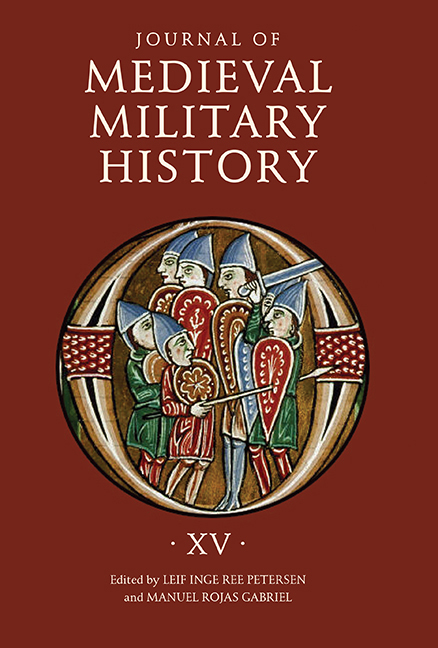Book contents
- Frontmatter
- Dedication
- Contents
- List of Illustrations
- Preface
- 1 Later Roman Grand Strategy: The Fortification of the urbes of Gaul
- 2 In Search of Equilibrium: Byzantium and the Northern Barbarians, 400–800
- 3 Evolving English Strategies during the Viking Wars
- 4 Norman Conquests: A Strategy for World Domination?
- 5 The Papacy and the Political Consolidation of the Catalan Counties, c. 1060–1100: A Case Study in Political Strategy
- 6 Alfonso VII of León-Castile in Face of the Reformulation of Power in al-Andalus, 1145–1157: An Essay in Strategic Logic
- 7 The Treaties between the Kings of León and the Almohads within the Leonese Expansion Strategy, 1157–1230
- 8 A Strategy of Total War? Henry of Livonia and the Conquest of Estonia, 1208–1227
- 9 The English Longbow, War, and Administration
- List of Contributors
- Journal of Medieval Military History
- De Re Militari and the Journal of Medieval Military History
8 - A Strategy of Total War? Henry of Livonia and the Conquest of Estonia, 1208–1227
Published online by Cambridge University Press: 21 August 2019
- Frontmatter
- Dedication
- Contents
- List of Illustrations
- Preface
- 1 Later Roman Grand Strategy: The Fortification of the urbes of Gaul
- 2 In Search of Equilibrium: Byzantium and the Northern Barbarians, 400–800
- 3 Evolving English Strategies during the Viking Wars
- 4 Norman Conquests: A Strategy for World Domination?
- 5 The Papacy and the Political Consolidation of the Catalan Counties, c. 1060–1100: A Case Study in Political Strategy
- 6 Alfonso VII of León-Castile in Face of the Reformulation of Power in al-Andalus, 1145–1157: An Essay in Strategic Logic
- 7 The Treaties between the Kings of León and the Almohads within the Leonese Expansion Strategy, 1157–1230
- 8 A Strategy of Total War? Henry of Livonia and the Conquest of Estonia, 1208–1227
- 9 The English Longbow, War, and Administration
- List of Contributors
- Journal of Medieval Military History
- De Re Militari and the Journal of Medieval Military History
Summary
In 1227 a priest, known today as Henry of Livonia, finished writing a history of events in his part of the world (the modern Baltic states of Latvia and Estonia) during the previous thirty or so years. His chronicle, by far the best of the written sources for the conquest and conversion of the pagan peoples of the region by military and missionary forces largely coordinated by the recently founded Latin church of Riga, is one of the most important of all sources for the conduct of war in the European Middle Ages. What Henry wrote about sieges and battles is undoubtedly valuable; these encounters were the action highlights of war and as such have long been of interest to medieval chroniclers and modern military historians. But rather less attention has hitherto been paid to what he wrote about the more mundane subject of raiding – almost certainly the most common form of warfare throughout the Middle Ages, and probably throughout most of world history too. As the first European author to describe what previous chroniclers had either disregarded as unremarkable routine or had, in twelfth-century England, treated rhetorically as barbaric atrocity, his insider's account of the early thirteenth-century conquest of Estonia, an unusually dispassionate narrative of raid and counter-raid, offers revealing insights into the obscure subject of the conduct of war in earlier centuries.
Henry and the Church of Riga
Nothing is known about Henry's earlier life apart from what can be inferred from his chronicle. This suggests that, no matter whether his parents were German or not, he was educated in north Germany, perhaps in the Magdeburg region and/or the monastery of Segeberg in Holstein, and that he entered the Baltic region in the service of Albert of Buxtehude, bishop of Riga/Livonia, probably in 1205, the year from which his narrative became noticeably more detailed.3 In 1208 he was made a priest and was sent to minister to the newly-baptized Letts living in the valley of the Ümera (Jumar), a tributary of the river Gauja (Aa), to the northeast of Riga. Here, right on the frontier of Latin Christendom, he was, in his own words, “exposed to many dangers.” In 1211 Estonian raiders burned his church down; in 1223 they plundered or burned his crops, houses, and belongings and stabled their horses in his (by now stone-built?) church.
- Type
- Chapter
- Information
- Journal of Medieval Military HistoryStrategies, pp. 186 - 214Publisher: Boydell & BrewerPrint publication year: 2017
- 1
- Cited by



